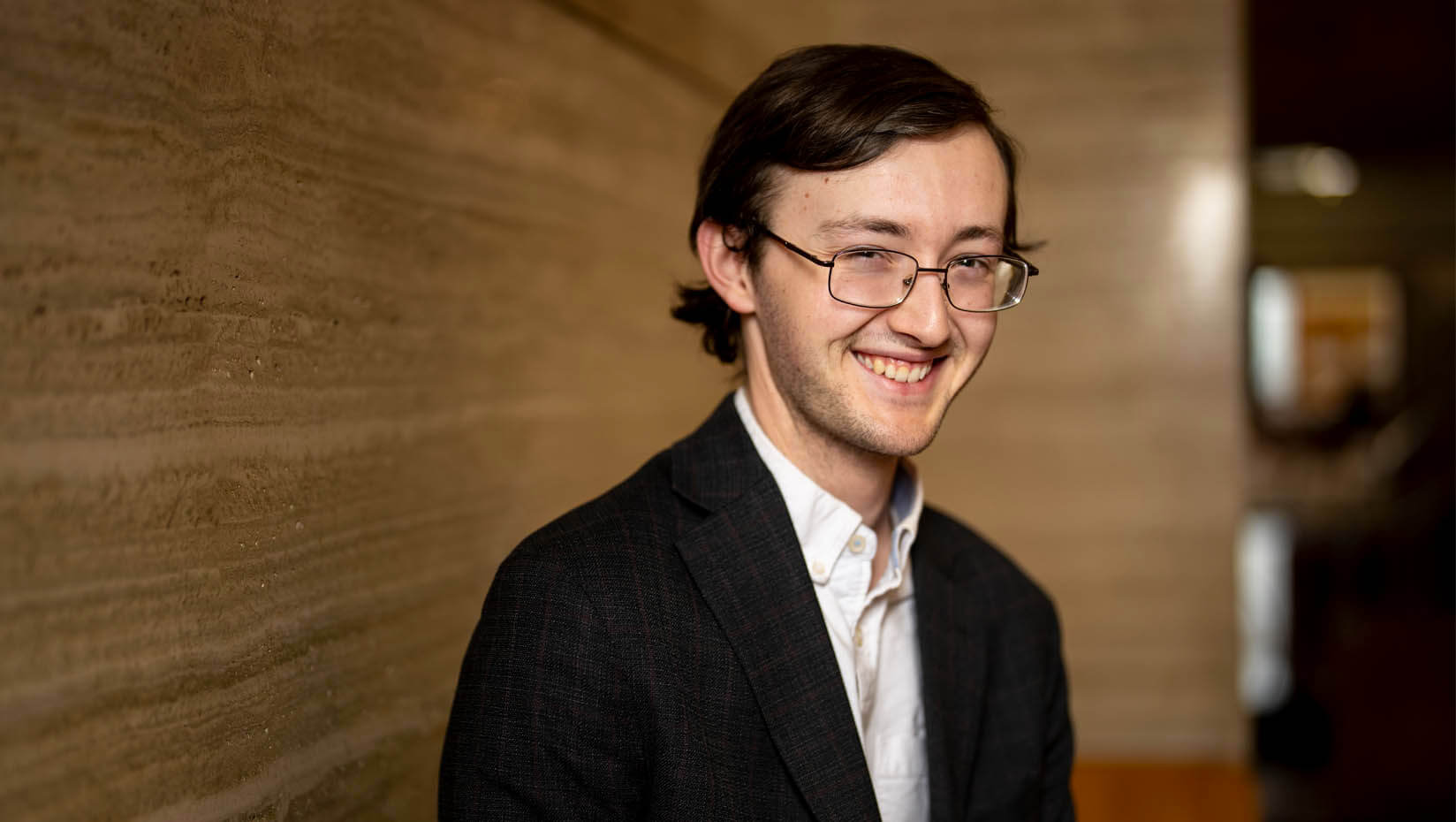
Sam Ransley: Presenting award-winning essay at a global forum
In fall 2022, University of Maine senior Sam Ransley of New Harbor, Maine, penned an essay about the threat of totalitarianism. He will soon present his essay to political science experts from across the U.S. and beyond at the World Social Science Association’s 65th Annual Conference in April in Tempe, Arizona.
Ransley, who is majoring in political science with a minor in economics, earned the opportunity to share his work at a global forum after winning the Bert & Phyllis Lamb Prize in Political Science. The award, for which Ransley was one of two recipients this year, also includes an online publication of his essay on the Lamb Prize website, a plaque and $1,000.
Ransley originally wrote the essay for a senior seminar taught by Robert Glover, associate professor of political science. Glover encouraged Ransley to apply for the award and helped him with the application and edits to his essay.
By attending the World Social Science Association conference, Ransley hopes to meet with various experts, inquire about their research and learn tips on how to someday become an adept political science professor and scholar.
“I’m grateful, and I hope to use the opportunity to learn a lot about the way political science conferences are done,” Ransley says. “There’s going to be a lot of smart people there, and I’m excited to talk to them.”
In his essay, Ransley contends that democracy can be undermined by authoritarianism and totalitarianism today due to the decline of moderating social institutions like community and family. He also argues that the rise of technology like social media can, inadvertently or otherwise, undermine democracy by isolating people, keeping them in echo chambers and causing existential loneliness.
“Democracy is one of the most important things to study, because without democracy, we don’t have the freedom to study anything else,” Ransley says. “I think that democracy — globally — is in a precarious place. I just worry that we might not learn from the lessons we should have already learned back in the 20th century.”
For Ransley, preserving democracy and preventing the rise of authoritarianism and totalitarianism is possible by building more relationships, particularly those across political ideologies and socioeconomic circumstances.
“I think we really should try to build relationships with every sort of person and make it something that matters, and establish, I would argue, a communitarian responsibility for one another,” he says, “because if we care about each other in a real deep way, I think that sort of thing can help stop the growth of totalitarianism. Because there is something more important than the government, and that’s your community.”
Ransley’s love for political science derived from a fascination with philosophy, particularly moral and ethical quandaries, he had since he was a child.
His interest broadened to authoritarianism and totalitarianism after reading works about early facism and “The Origins of Totalitarianism,” by political philosopher Hannah Arendt. Her work has been vital to Ransley’s studies in all three capstone courses he has taken at UMaine, as well as to the arguments in his essay.
When he first enrolled at UMaine, Ransley was an economics major, then switched to education before settling on pursuing a political science degree. The Early Modern Political Thought course with Robert Ballingall, assistant professor of political science, that Ransley took his sophmore year was a key driver in his decision to switch majors, he says. Ransley, however, decided to keep studying economics as a minor because of its influence on politics, he says.
“When I went home after that semester, I decided to build a government on paper,” Ransley says, “and I basically wrote up a draft constitution for this fake republic and I debated it with my friends for the following three or four months. Once I did that, I realized that this is amazing, this is brilliant and I cannot do anything else other than political science. It’s so fulfilling!”
Ransley says all of his professors, no matter their subject matter, “had a profound influence on my personal and academic life.” Ballingall, Glover and Rebecca Buchanan, assistant professor of curriculum, assessment and instruction, in particular, have demonstrated a passion for their areas of study to their students in ways Ransley hopes to replicate when he eventually becomes an educator.
“The faculty is brilliant,” Ransley says.
In addition to his studies, Ransley participated in student government for two years — which included serving as chair of the mental health services committee — as well as ballet and tango club. Ransley also served as president of the Commuter and Nontraditional Student Association, which he says provided him with a close-knit community.
After UMaine, Ransley will pursue a master’s degree in political science at Dalhousie University in Halifax, Nova Scotia.
Contact: Marcus Wolf, 207.581.3721; marcus.wolf@maine.edu
